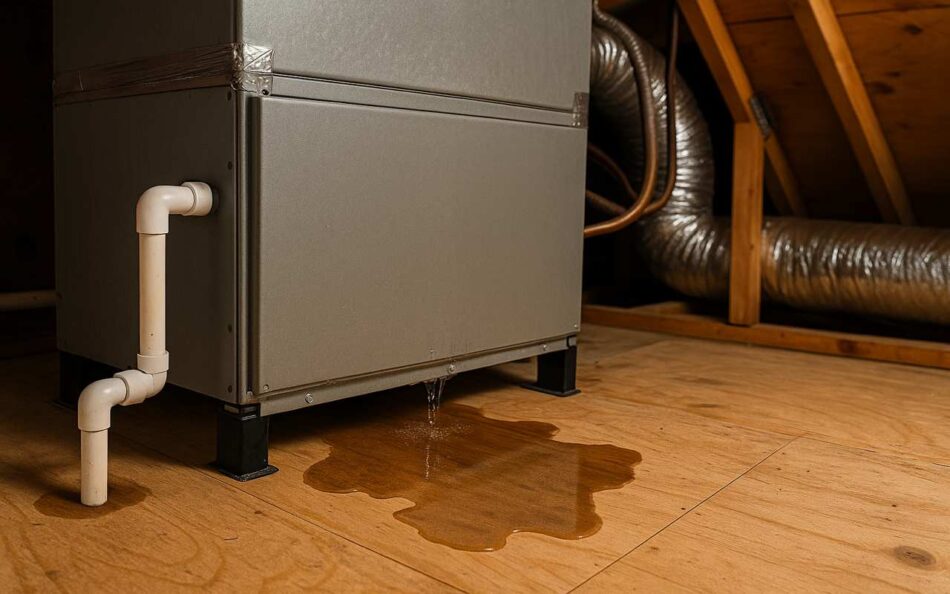Why Is My AC Leaking Water? Common Causes and How to Stop It

If you’ve noticed water pooling around your air conditioner or dripping from vents or ceilings, you’re not alone. An AC leaking water is one of the most frequent reasons homeowners in Florida call for service. While it might seem like a minor issue at first, water leaks can lead to serious damage, mold growth, and system failure if left unaddressed. Understanding why your system is leaking is the first step toward getting your cooling back on track.
Understanding How Your AC Removes Moisture
Before jumping into what’s going wrong, it helps to understand that air conditioners naturally produce water. In humid climates like Florida, your AC pulls moisture from the air as part of the cooling process. This moisture collects on the evaporator coil and drips into a drain pan, then flows through a condensate drain line to be safely removed from your home. When everything is working properly, you won’t see any water. But if one part of this moisture removal system fails, it can quickly result in visible water damage.
1. A Clogged Condensate Drain Line
One of the most common causes of an AC leaking water is a clogged drain line. Over time, algae, mold, dust, or debris can accumulate in the pipe, blocking the flow of water. When this happens, the water backs up and starts to overflow, often leaking inside your home near the air handler.
If your unit is in an attic, closet, or ceiling space, this can lead to stains on drywall, soaked insulation, or even structural damage. Some systems are equipped with a safety shut-off switch, which turns off the AC when a clog is detected, but not all units have this protection.
2. A Cracked or Rusted Drain Pan
The drain pan sits below the evaporator coil and catches condensation before it exits through the drain line. If the pan is cracked, rusted, or improperly aligned, water will leak directly from the unit. This issue is especially common in older air handlers where corrosion has weakened the metal pan over time. A damaged drain pan can often go unnoticed for weeks slowly leaking and promoting mold growth until visible signs appear.
3. Frozen Evaporator Coils
When your system is low on refrigerant or airflow is restricted, the evaporator coil can get too cold and freeze over. Once the ice melts, the excess water overwhelms the drain pan and spills out.
This condition is often caused by:
- Dirty air filters restricting airflow
- Low refrigerant levels from a leak
- Blocked return vents
- A malfunctioning blower fan
If you notice reduced cooling, weak airflow, or ice forming on the copper lines, frozen coils could be to blame.
4. Low Refrigerant Levels
Refrigerant doesn’t just cool your air it also keeps the evaporator coil operating at the correct temperature. When refrigerant levels are too low due to a leak, the coil can get too cold and ice up. As the ice melts, water leaks from the air handler. Unlike clogged drains, this is not a DIY fix. Refrigerant issues require a licensed HVAC technician to locate the leak, seal it, and recharge your system to the correct level.
5. Dirty or Clogged Air Filters
Air filters protect your system from dust and debris, but when they get too dirty, they can cause major problems. A clogged filter restricts airflow, which can cause the evaporator coil to freeze. As we’ve mentioned, frozen coils lead to water leaks once the ice starts to thaw. Changing your filters every 30 to 90 days is a simple way to prevent this from happening. If you’re in Florida and run your AC most of the year, replacing filters monthly is often necessary.
6. Poor AC Installation or Sizing
If your AC system was improperly installed or not sized correctly for your home, you could experience frequent issues with condensation and drainage. Units that are too large for the space may cycle on and off too quickly, causing moisture buildup that the system doesn’t have time to remove.
Improper leveling of the unit can also cause water to pool in the wrong areas rather than draining properly. If you’ve had persistent issues since installation, it might be worth getting a second opinion from a different HVAC professional.
What Should You Do If Your AC Is Leaking Water?
First, turn off the system to prevent further damage and avoid electrical hazards. Then, check the following:
- Look at the air filter if it’s dirty, replace it.
- Inspect the drain line if it’s accessible and try to clear any visible blockages with a wet-dry vacuum.
- Check for signs of ice or frost on the coils or refrigerant lines.
- See if water is leaking from underneath the indoor air handler or coming through ceiling vents.
If you’re unsure what’s causing the leak, or if the problem returns after basic maintenance, call in a professional. A trained technician can diagnose the exact cause, whether it’s refrigerant, airflow, drainage, or something else.
Prevent Water Leaks With Regular Maintenance
Routine maintenance is the best defense against unexpected water damage. During a tune-up, an HVAC technician will clear the drain line, check refrigerant levels, clean the coil, and make sure your system is running efficiently. In humid regions like South Florida, where systems run nearly year-round, scheduling maintenance twice a year before summer and again in fall helps avoid emergency breakdowns and costly repairs.
Call Cusano Air Conditioning If Your AC Is Leaking
Don’t ignore a leaking AC it’s often a sign of a larger issue that can damage your home and shorten your system’s lifespan. At Cusano Air Conditioning, we help homeowners across South Florida get fast, professional repairs and maintenance that keep systems running smoothly.